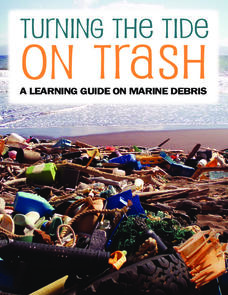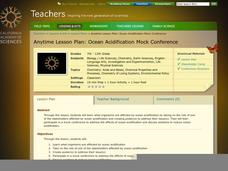NOAA
A Day in the Life of an Ocean Explorer
What's life like aboard an ocean exploration vessel? Junior oceanographers examine the important role of communication in ocean research in lesson plan two of a five-part series from NOAA. The materials introduce the class to life on...
Consortium for Ocean Science Exploration and Engagement (COSEE)
One Ocean: It Matters!
Here is the first of four poignant lessons on how humans and oceans interact, even if people live far from the coast. This particular lesson also examines studies that are taking place in Antarctica of how climate change is affecting the...
Curated OER
National Marine Sanctuaries Fish
Information is provided on Gray's Reef, Florida Keys, and Flower Garden Banks marine sanctuaries. Young marine biologists then visit the FishBase and REEF databases to collect fish species information for each location. They then...
NOAA
Turning the Tide on Trash: A Learning Guide on Marine Debris
The lessons in this learning guide are designed to increase youngsters' awareness of the impacts of marine debris and to teach them about pollution prevention techniques. This fabulous, 30-page packet is chock full of important...
Curated OER
Turning the Tide on Trash: Marine Debris Curriculum
Seven pages of fascinating reading on marine debris preface the activities in this lesson plan. Four different activities are employed to simulate how the debris is distributed in the ocean and along beaches. Early ecology learners...
Howard Hughes Medical Institute
Ocean Acidification
Human impacts on the environment can sometimes be difficult to measure, especially under water! An activity centered on ocean acidification gives science scholars the opportunity to examine the effects of carbon dioxide on marine life....
PBS
The Ocean and Climate: Heat Redistribution
Here on Earth, heat goes with the flow! Young climatologists dive in to the connection between ocean currents and heat distribution during a science lesson plan. Scholars work with interactive and print resources to create a thorough...
Consortium for Ocean Science Exploration and Engagement (COSEE)
Life in an Ocean World
How does the shell color of crabs and the habitat they live in impact the predator-prey relationship? The fourth activity in a series of five is a game where participants try not to get eaten if they are a prey and try to eat if they are...
Curated OER
Turning the Tide on Trash: Marine Debris Curriculum
Six different lessons comprise this unit on marine debris. Science, language arts, social studies, and art projects make this an ideal interdisciplinary unit. The result will be well-informed future citizens who can help make a...
NOAA
Sustaining Our Ocean Resources
Lead young scientists on an investigation of fishery practices with the final installment of this four-part unit. Using a PowerPoint presentation and hands-on simulation, this activity engages children in learning how fish populations...
NOAA
An Ocean of Energy
Young biologists trace the path of the sun's energy through marine ecosystems in the second part of this four-lesson series. Building on prior knowledge about producers, consumers, and decomposers students are introduced to the concept...
NOAA
Deep-Sea Ecosystems – Life is Weird!
A pool of brine in the deep sea can be up to four times as salty as the surrounding sea water. The deep sea ecosystem relies on chemosynthesis and the organisms that live there are often strange to us. The lesson focuses on researching...
California Academy of Science
The Heat is On: Cause and Effect and Climate
The higher the number of letters in the final word for the National Spelling Bee, the higher the number of people killed by venomous spiders. Obviously, those two facts correlate, but no causation exists. Scholars view data based on...
NOAA
Stressed Out!
Are our oceans really suffering due to the choices humans make? The sixth and final installment in the volume of activities challenges research groups to tackle one of six major topics that impact ocean health. After getting to the...
Curated OER
Sponge-Painted Ocean Mural
I love big mural projects. They bring a sense of ownership to the classroom, look great for parents, and can be a great way to complete a unit. Here are the steps and suggestions needed to create an ocean mural for your class. Learners...
California Academy of Science
Ocean Acidification Mock Conference
In a comprehensive role playing activity, teens play the parts of different stakeholders in the realm of acidic oceans. They research, debate, and create a presentation from the perspective of either ocean organisms, the fishing...
Curated OER
Where Did They Come From?
Give science learners nine questions about the biogeography of hydrothermal vents and turn them loose to research this fascinating habitat. Working in cooperative groups, they prepare a report that addresses each of the questions. A...
Curated OER
What's in That Cake?
Cooperative groups research trip logs from deep-sea expeditions and explore characteristics of deepwater habitats. Using a cake as the ocean floor, they work together to decorate it as a model of such habitats. They also prepare a...
NOAA
Deep-Sea Ecosystems – Entering the Twilight Zone
Imagine an ecosystem without any light or oxygen, where living things convert carbon dioxide into food. This ecosystem is thriving and might just be the largest ecosystem on our planet, yet we know very little about it. The lesson...
Curated OER
Whale Song Acrostic
What do whales sing about? Invite your class to imagine the thoughts of whales before writing acrostic poems on the topic. The plan blends together a bit of life science with plenty of opportunities for creativity and writing.
Scientific American
Life-Sized Drawing
Ocean explorers or mathematicians research the wreck of the CSS H.L. Hunley. They investigate the actual dimensions of the Hunley using math and measuring skills. Afterward, they sketch a large scale drawing of the submarine outdoors on...
Wilderness Classroom
Ocean Life
Our oceans are composed of many complex relationships. Young oceanographers explore relationships between organisms, understand the world ocean's currents, and discover the effects of water pollution and how it behaves. There are three...
NOAA
It's a Roughy Life
Scientists recently discovered several previously unknown species at the Bear Seamount off the coast of New England. Scholars research these new species — benthopelagic, benthic, and seamount fish — and find out what makes them unique....
NOAA
What Little Herc Saw
See the underwater world through a different pair of eyes! Middle school marine biologists identify deep-sea organisms by examining images taken by an ROV from the Okeanos Explorer. After determining what creatures lie beneath the...

























